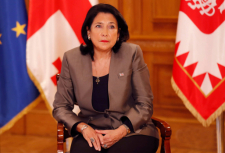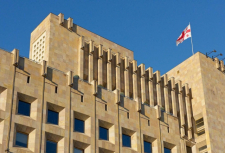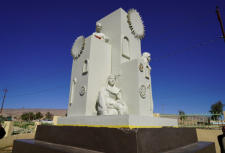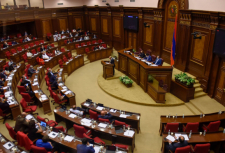Telek - a tiny village on the Armenian - Turkish border
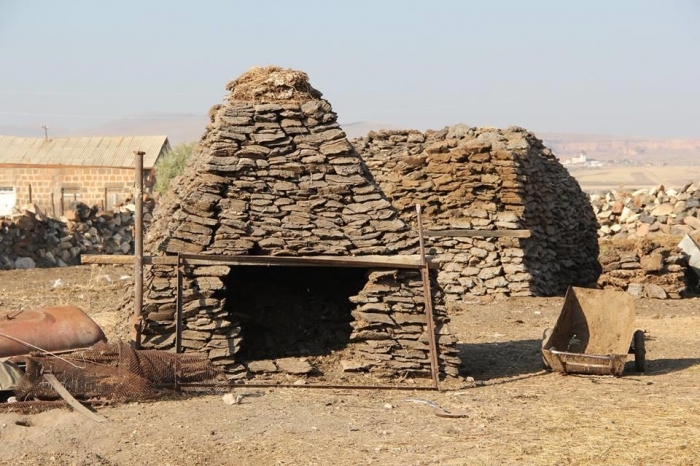
It is impossible to enter here unnoticed: to meet a stranger the whole village will come out. There is no exaggeration in this, because there are only seven families living in the whole of Talek.
However, only men will communicate with visitors - women cannot talk to strangers, especially men. It’s better to avoid conversations with men, just in case, even if you know him.
Such rules reign in the village of Talek, in which live representatives of the most conservative community of Armenia - Yazidis.
Translated into the bureaucratic language used by local authorities, the families of the Talek are 22 voters, five members of the Council of elders and the village head, who was recently elected. The former left the country, like many other villagers, and had to hold extraordinary elections here. From the two candidates with sixteen votes in favor was elected Slavik Saloyan.
The door of the village administration is constantly locked, but it is easy to find the head of the village – he is always somewhere nearby.
Surik Khachatryan is the oldest in the village, he is 74. On the rights of the elders he resolves to talk to women.
The most talkative turned out to Alif Samoyan. Alif has recently returned to Armenia from Russia, where she lived for several years. She came back to marry her son. The marriage of the children for the Yazidis is a special question. Marriage to a girl of another nationality is considered a voluntary renunciation of the faith. Community will reject the rebel, who will dare to take this step, forever. Therefore, marriages of people who met by accident, are very rare. Moreover, as if specifically to demonstrate the matchmaking process, a woman from another village came to Talek - to see the potential daughter-in-law.
Women are usually dressed as residents of any other village in Armenia. National dress of Yazidis is no longer in fashion, explains Alif. Well, except that elderly women - they still wear headscarves on their heads. National dishes have also been lost - in everyday life, the Housewives left only kavurma - that is, the tradition of preparing for the winter roasted meat. More enduring was the tradition of separate feasts for women and men. At weddings and other events, two tables are served; ideally, men and women sit alltogether in different rooms, but when this is impossible, tradition permits to separate feastings with the curtain.
According to Surik, after the Declaration of Armenia's independence, the authorities forgot about this village. For example, the neighboring Armenian villages are somehow provided with the necessary conditions for human life. Talking about life in the village, Surik briefly lists what can’t be done in Talek, namely: you can’t drink water from the tap, you cannot go to the store, you can’t sell the house. Water supply was lost soon after the collapse of the Union, about the same time the store was closed.
Elders – both former and present - have repeatedly appealed to the district leaders to decide at least the issue of drinking water, but it is useless. The Talek people buy it from the water carriers that come here. And these machines, by the way, can’t appear in the village for weeks. Surik Khachatryan considers these offensive, calls the attitude of the authorities to the village of Talek discrimination on ethnicity.
Water is the only purchase that can be made on site. For everything else, even if it is a very basic minimum, like salt and matches, you need to go to the store - it is located 15 kilometers away. It is not surprising that the real estate in Talek is not quoted at all and it is not possible to sell the house here. Residents have repeatedly appealed to the authorities, but they are inactive. This is discrimination, says Surik, because the neighboring Armenian villages are at the very least - poorly provided with necessary.
Like many old people in Armenia, Surik remembers the old days not without nostalgia. Then 110 families lived in the village; people were engaged in agriculture, bred cattle. Each family had one hundred head of cattle - large and small.
From the beginning of the 90s, life began to decline, the village was empty. Most of the local residents went abroad, the rest went to Armenia. Before leaving, people locked the doors and windows and gave the keys to those who remained. Gradually, almost everyone left.
Almost all the houses in the village are empty. Sometimes they are temporarily settled by residents of neighboring villages, who drive the cattle to the high seasonal pastures. This year there were eleven families living in Talek, but by winter they had gone home. And the village was empty again.
The village of Talek of Aragatsotn region of Armenia is one of the few settlements where only Yazidis have always lived. They live here with their spiritual leaders, who make sure that the national traditions are preserved. Mainly in the village engaged in cattle – this contributed to the favorable geographical position.
Translated by David Babaev
Yazidis.info
Tags:
Telek - a tiny village on the Armenian - Turkish border

It is impossible to enter here unnoticed: to meet a stranger the whole village will come out. There is no exaggeration in this, because there are only seven families living in the whole of Talek.
However, only men will communicate with visitors - women cannot talk to strangers, especially men. It’s better to avoid conversations with men, just in case, even if you know him.
Such rules reign in the village of Talek, in which live representatives of the most conservative community of Armenia - Yazidis.
Translated into the bureaucratic language used by local authorities, the families of the Talek are 22 voters, five members of the Council of elders and the village head, who was recently elected. The former left the country, like many other villagers, and had to hold extraordinary elections here. From the two candidates with sixteen votes in favor was elected Slavik Saloyan.
The door of the village administration is constantly locked, but it is easy to find the head of the village – he is always somewhere nearby.
Surik Khachatryan is the oldest in the village, he is 74. On the rights of the elders he resolves to talk to women.
The most talkative turned out to Alif Samoyan. Alif has recently returned to Armenia from Russia, where she lived for several years. She came back to marry her son. The marriage of the children for the Yazidis is a special question. Marriage to a girl of another nationality is considered a voluntary renunciation of the faith. Community will reject the rebel, who will dare to take this step, forever. Therefore, marriages of people who met by accident, are very rare. Moreover, as if specifically to demonstrate the matchmaking process, a woman from another village came to Talek - to see the potential daughter-in-law.
Women are usually dressed as residents of any other village in Armenia. National dress of Yazidis is no longer in fashion, explains Alif. Well, except that elderly women - they still wear headscarves on their heads. National dishes have also been lost - in everyday life, the Housewives left only kavurma - that is, the tradition of preparing for the winter roasted meat. More enduring was the tradition of separate feasts for women and men. At weddings and other events, two tables are served; ideally, men and women sit alltogether in different rooms, but when this is impossible, tradition permits to separate feastings with the curtain.
According to Surik, after the Declaration of Armenia's independence, the authorities forgot about this village. For example, the neighboring Armenian villages are somehow provided with the necessary conditions for human life. Talking about life in the village, Surik briefly lists what can’t be done in Talek, namely: you can’t drink water from the tap, you cannot go to the store, you can’t sell the house. Water supply was lost soon after the collapse of the Union, about the same time the store was closed.
Elders – both former and present - have repeatedly appealed to the district leaders to decide at least the issue of drinking water, but it is useless. The Talek people buy it from the water carriers that come here. And these machines, by the way, can’t appear in the village for weeks. Surik Khachatryan considers these offensive, calls the attitude of the authorities to the village of Talek discrimination on ethnicity.
Water is the only purchase that can be made on site. For everything else, even if it is a very basic minimum, like salt and matches, you need to go to the store - it is located 15 kilometers away. It is not surprising that the real estate in Talek is not quoted at all and it is not possible to sell the house here. Residents have repeatedly appealed to the authorities, but they are inactive. This is discrimination, says Surik, because the neighboring Armenian villages are at the very least - poorly provided with necessary.
Like many old people in Armenia, Surik remembers the old days not without nostalgia. Then 110 families lived in the village; people were engaged in agriculture, bred cattle. Each family had one hundred head of cattle - large and small.
From the beginning of the 90s, life began to decline, the village was empty. Most of the local residents went abroad, the rest went to Armenia. Before leaving, people locked the doors and windows and gave the keys to those who remained. Gradually, almost everyone left.
Almost all the houses in the village are empty. Sometimes they are temporarily settled by residents of neighboring villages, who drive the cattle to the high seasonal pastures. This year there were eleven families living in Talek, but by winter they had gone home. And the village was empty again.
The village of Talek of Aragatsotn region of Armenia is one of the few settlements where only Yazidis have always lived. They live here with their spiritual leaders, who make sure that the national traditions are preserved. Mainly in the village engaged in cattle – this contributed to the favorable geographical position.
Translated by David Babaev
Yazidis.info
Tags:
